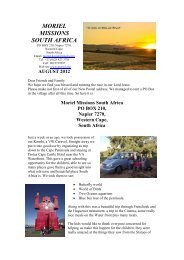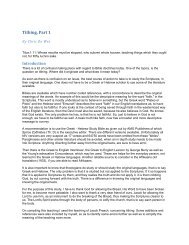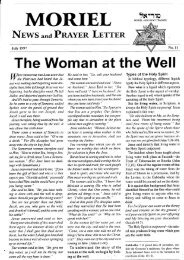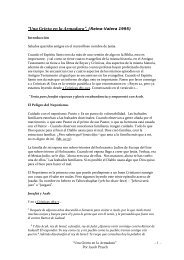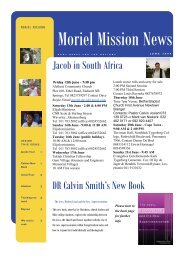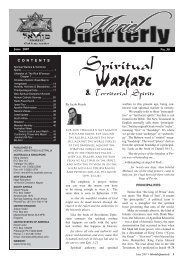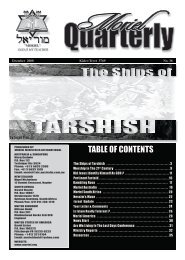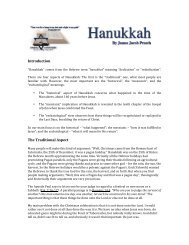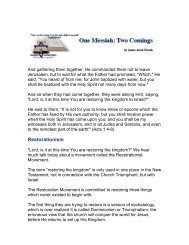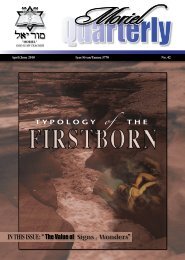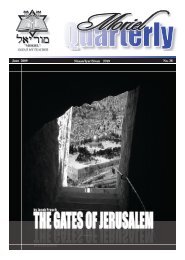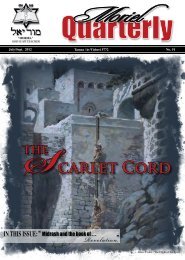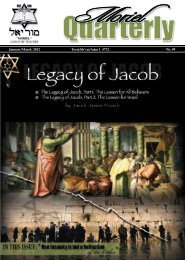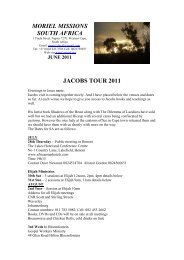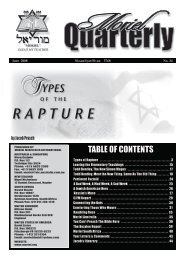Kashrut and Famine (~17.69 MB) - Moriel Ministries
Kashrut and Famine (~17.69 MB) - Moriel Ministries
Kashrut and Famine (~17.69 MB) - Moriel Ministries
Create successful ePaper yourself
Turn your PDF publications into a flip-book with our unique Google optimized e-Paper software.
Feature Article Jacob Prasch Jacob Prasch Feature Article<br />
I<br />
The Lord spoke again, ‘These are the creatures which you may eat from all the animals that are<br />
on the earth.”<br />
kashrut<br />
Introduction<br />
<strong>and</strong><br />
famine<br />
The Hebrew Dietary Laws are found<br />
in Dueteronomy 14 <strong>and</strong> Leviticus 11<br />
is the more inclusive version.<br />
The Lord spoke again to Moses <strong>and</strong> to<br />
Aaron, saying to them, “Speak to the<br />
sons of Israel, saying, ‘These are the<br />
creatures which you may eat from all<br />
the animals that are on the earth.<br />
Whatever divides a hoof, thus making<br />
split hoofs, <strong>and</strong> chews the cud, among<br />
the animals, that you may eat.<br />
Nevertheless, you are not to eat of these,<br />
among those which chew the cud, or<br />
among those which divide the hoof: the<br />
camel, for though it chews cud, it does<br />
not divide the hoof, it is unclean to you.<br />
Likewise, the shaphan, for though it<br />
chews cud, it does not divide the hoof,<br />
it is unclean to you; (it had to be both<br />
chew the cud <strong>and</strong> divide the hoof) the<br />
rabbit also, for though it chews cud, it<br />
does not divide the hoof, it is unclean to<br />
you; <strong>and</strong> the pig, for though it divides<br />
the hoof, thus making a split hoof, it<br />
does not chew cud, it is unclean to you.<br />
You shall not eat of their flesh nor touch<br />
their carcasses; they are unclean to you.<br />
‘These you may eat, whatever is in the<br />
water: all that have fins <strong>and</strong> scales,<br />
those in the water, in the seas or in the<br />
rivers, you may eat.<br />
But whatever is in the seas <strong>and</strong> in the<br />
rivers that does not have fins <strong>and</strong> scales<br />
(in other words, shellfish) among<br />
all the teeming life of the water, <strong>and</strong><br />
among all the living creatures that are<br />
in the water, they are detestable things<br />
to you, <strong>and</strong> they shall be abhorrent to<br />
you; (notice the words detestable <strong>and</strong><br />
abhorrent–the recur throughout this<br />
passage); you may not eat of their flesh,<br />
<strong>and</strong> their carcasses you shall detest.<br />
Whatever in the water does not have<br />
fins <strong>and</strong> scales is abhorrent to you.<br />
‘These, moreover, you shall detest<br />
among the birds; they are abhorrent,<br />
not to be eaten: the eagle <strong>and</strong> the vulture<br />
<strong>and</strong> the buzzard, <strong>and</strong> the kite <strong>and</strong><br />
the falcon in its kind, every raven in<br />
its kind, <strong>and</strong> the ostrich <strong>and</strong> the owl<br />
<strong>and</strong> the sea gull <strong>and</strong> the hawk in its<br />
kind, <strong>and</strong> the little owl <strong>and</strong> the cormorant<br />
<strong>and</strong> the great owl, <strong>and</strong> the white<br />
owl <strong>and</strong> the pelican <strong>and</strong> the carrion<br />
vulture, <strong>and</strong> the stork, the heron in its<br />
kinds, <strong>and</strong> the hoopoe, <strong>and</strong> the bat.<br />
All the winged insects that walk on all<br />
fours are detestable to you. Yet these<br />
you may eat among all the winged insects<br />
which walk on all fours: those<br />
which have above their feet jointed<br />
A Midrashic<br />
commentary<br />
on<br />
Dietary<br />
prohibitions <strong>and</strong><br />
the<br />
famine<br />
for<br />
the<br />
Word of God !<br />
Written by,<br />
James Jacob Prasch<br />
legs with which to jump on the earth.<br />
These of them you may eat: the locust<br />
in its kinds, <strong>and</strong> the devastating locust<br />
in its kinds, <strong>and</strong> the cricket in its kinds,<br />
<strong>and</strong> the grasshopper in its kinds.<br />
But all other winged insects which are<br />
four-footed are detestable to you.<br />
‘By these, moreover, you will be made<br />
unclean: whoever touches their carcasses<br />
becomes unclean until evening,<br />
<strong>and</strong> whoever picks up any of their carcasses<br />
shall wash his clothes <strong>and</strong> be<br />
unclean until evening.<br />
Concerning all the animals which divide<br />
the hoof but do not make a split<br />
hoof, or which do not chew cud, they<br />
are unclean to you: whoever touches<br />
them becomes unclean.<br />
Also whatever walks on its paws,<br />
among all the creatures that walk on<br />
all fours, are unclean to you; whoever<br />
touches their carcasses becomes unclean<br />
until evening, <strong>and</strong> the one who<br />
picks up their carcasses shall wash his<br />
clothes <strong>and</strong> be unclean until evening;<br />
they are unclean to you.<br />
‘Now these are to you the unclean<br />
among the swarming things which<br />
swarm on the earth: the mole, <strong>and</strong><br />
the mouse, <strong>and</strong> the great lizard in its<br />
kinds, <strong>and</strong> the gecko, <strong>and</strong> the crocodile,<br />
<strong>and</strong> the lizard, <strong>and</strong> the s<strong>and</strong> reptile,<br />
<strong>and</strong> the chameleon.<br />
These are to you the unclean among<br />
all the swarming things; whoever<br />
touches them when they are dead becomes<br />
unclean until evening.<br />
Also anything on which one of them<br />
may fall when they are dead becomes<br />
unclean, including any wooden article,<br />
or clothing, or a skin, or a sack—any<br />
article of which use is made—it shall<br />
be put in the water <strong>and</strong> be unclean until<br />
evening, then it becomes clean. As<br />
for any earthenware vessel into which<br />
one of them may fall, whatever is in it<br />
becomes unclean <strong>and</strong> you shall break<br />
the vessel.<br />
Any of the food which may be eaten,<br />
on which water comes, shall become<br />
unclean, <strong>and</strong> any liquid which may<br />
be drunk in every vessel shall become<br />
unclean.<br />
Everything, moreover, on which part<br />
of their carcass may fall becomes<br />
unclean; an oven or a stove shall be<br />
smashed; they are unclean <strong>and</strong> shall<br />
continue as unclean to you. Nevertheless<br />
a spring or a cistern collecting water<br />
shall be clean, though the one who<br />
touches their carcass shall be unclean.<br />
If a part of their carcass falls on any<br />
seed for sowing which is to be sown, it<br />
is clean. Though if water is put on the<br />
seed <strong>and</strong> a part of their carcass falls<br />
on it, it is unclean to you.<br />
‘Also if one of the animals dies which<br />
you have for food, the one who touches<br />
its carcass becomes unclean until<br />
evening.<br />
He too, who eats some of its carcass<br />
shall wash his clothes <strong>and</strong> be unclean<br />
until evening, <strong>and</strong> the one who picks<br />
up its carcass shall wash his clothes<br />
<strong>and</strong> be unclean until evening.<br />
‘Now every swarming thing that<br />
swarms on the earth is detestable, not<br />
to be eaten. Whatever crawls on its<br />
belly, <strong>and</strong> whatever walks on all fours,<br />
whatever has many feet, in respect to<br />
every swarming thing that swarms on<br />
the earth, you shall not eat them, for<br />
they are detestable.<br />
Do not render yourselves detestable<br />
through any of the swarming things<br />
that swarm; <strong>and</strong> you shall not make<br />
yourselves unclean with them so that<br />
you become unclean.<br />
For I am the Lord your God. Consecrate<br />
yourselves therefore, <strong>and</strong> be<br />
holy, for I am holy. And you shall not<br />
make yourselves unclean with any of<br />
the swarming things that swarm on<br />
the earth.<br />
For I am the Lord who brought you up<br />
from the l<strong>and</strong> of Egypt to be your God;<br />
thus you shall be holy, for I am holy.’”<br />
This is the law regarding the animal<br />
<strong>and</strong> the bird, <strong>and</strong> every living thing<br />
that moves in the waters <strong>and</strong> everything<br />
that swarms on the earth, to<br />
make a distinction between the unclean<br />
<strong>and</strong> the clean, <strong>and</strong> between the<br />
edible creature <strong>and</strong> the creature which<br />
is not to be eaten. (Leviticus 11:1-47)<br />
A LACK OF FOOD IS FAMINE<br />
During the Intertestamental Period the<br />
people had the Maccabees, but they had no<br />
prophets.<br />
There was no prophet from the time of<br />
Malachi to the time of John the Baptist. He<br />
came in the spirit of Elijah <strong>and</strong> fed God’s<br />
people during the famine.<br />
So it will be before Jesus comes. There<br />
will be a famine for the hearing of the Word<br />
of God.<br />
“Behold, days are coming,” declares<br />
the Lord God,“When I will send a famine<br />
on the l<strong>and</strong>, Not a famine for bread<br />
or a thirst for water, But rather for hearing<br />
the words of the Lord. (Amos 8:11)<br />
The way Elijah fed the Gentile woman<br />
<strong>and</strong> her son is a type of the way the ministry<br />
of Elijah will operate in the Last Days.<br />
PUBLIC HEATH<br />
These dietary laws are interesting. Jesus<br />
said, “What goes into the mouth does not<br />
make unclean, but what comes out of his<br />
mouth, that is what makes him unclean.”<br />
(Matthew 15:11)<br />
So there is obviously a meaning to it beyond<br />
public health. Nonetheless, let’s begin<br />
there.<br />
In the ancient Near East, with its lack<br />
of refrigeration <strong>and</strong> a desert environment<br />
where animals scavenged to survive, there<br />
was high risk of food poisoning.<br />
In particular, illnesses like trichinosis <strong>and</strong><br />
botulism could be contracted from eating<br />
certain kinds of foods. Pork or shellfish–not<br />
properly frozen, preserved or cooked, eaten<br />
in the kind of environment–was potentially<br />
deadly.<br />
So there was a legitimate medical reason<br />
not to eat these foods.<br />
PEOPLE WHO ARE IN A FAMINE WILL<br />
EAT ANYTHING<br />
But in a famine, anthropologists tell us,<br />
even the most civilized of human beings<br />
will eat anything.<br />
There are case studies where survivors<br />
of a shipwreck, for example, have actually<br />
resorted to cannibalism, eating the flesh of<br />
their own friends, even their own families.<br />
Notice in verse 47, you are to make a distinction<br />
between which is kosher <strong>and</strong> that<br />
which is not kosher, between the clean <strong>and</strong><br />
the unclean, between the eatable <strong>and</strong> that<br />
which is not to be eaten.<br />
The text continually reiterates that if<br />
something is not kosher it is to be detestable,<br />
abhorrent, loathsome.<br />
The thought of eating them should make<br />
us feel sick. These things shall be abhorrent<br />
to you–rats, serpents, bats, roaches, they<br />
shall be abhorrent to you.<br />
Just thinking about eating something like<br />
that should make you feel sick.<br />
But in a famine people get hungry enough<br />
to eat anything. They will even devour each<br />
other.<br />
GOD BECAME FLESH<br />
In the beginning was the Word, <strong>and</strong><br />
the Word was with God, <strong>and</strong> the Word<br />
was God. He was in the beginning<br />
with God... And the Word (Logos) became<br />
flesh, <strong>and</strong> dwelt among us, (John<br />
1:1,14).<br />
The word for dwelt in Greek is kataskenoo.<br />
It is the Greek translation of the Hebrew<br />
verb to tabernacle.<br />
The Hebrew is mishkan (from which<br />
comes (Skekinah). Mishkan speaks of<br />
God’s dwelling place. John is saying that<br />
the same God who was present with ancient<br />
Israel–the Shekinah who dwelt in the tabernacle,<br />
the Mishkan–had now become flesh.<br />
GOD HAD BECOME A MAN<br />
The ancient Greeks were dualists. They<br />
understood about the Logos, the creative<br />
agent of God <strong>and</strong> even the salvific agent of<br />
God, but their concept was of a transcendent<br />
Being.<br />
The minute you say God became a man,<br />
the Word became flesh, the Greeks could<br />
not h<strong>and</strong>le it.<br />
They believed that everything physical<br />
was evil; everything spiritual was good.<br />
Anything physical was regarded as the domain<br />
of a lesser god.<br />
Notice how this perverts a biblical truth.<br />
The Bible doesn’t say everything physical<br />
is bad. It says everything physical is<br />
fallen, <strong>and</strong> has temporarily come under the<br />
domain of Satan.<br />
Satan’s lies always pervert a truth.<br />
DUALISM<br />
Among the Greeks there were two main<br />
philosophical groups: the Stoics <strong>and</strong> the<br />
Epicureans.<br />
The Stoics eschewed everything physical<br />
<strong>and</strong> lived a monastic life based on mortification<br />
of the flesh.<br />
The Epicureans lived a life of lasciviousness.<br />
They believed that only the spiritual<br />
realm mattered.<br />
Both groups taught that there was a split<br />
between the physical world <strong>and</strong> the spiri-<br />
<strong>Moriel</strong> Quarterly • June 2013 June 2013 • <strong>Moriel</strong> Quarterly



